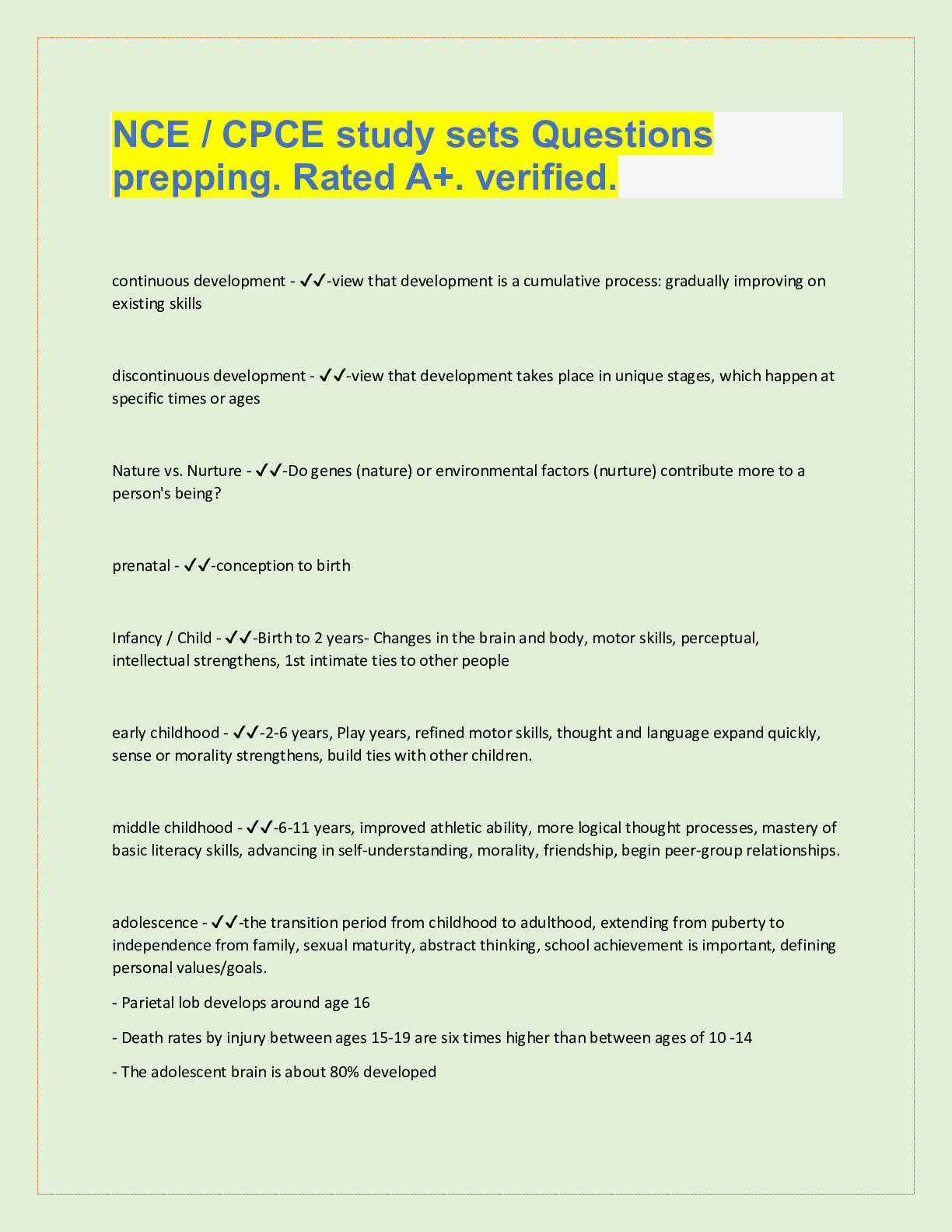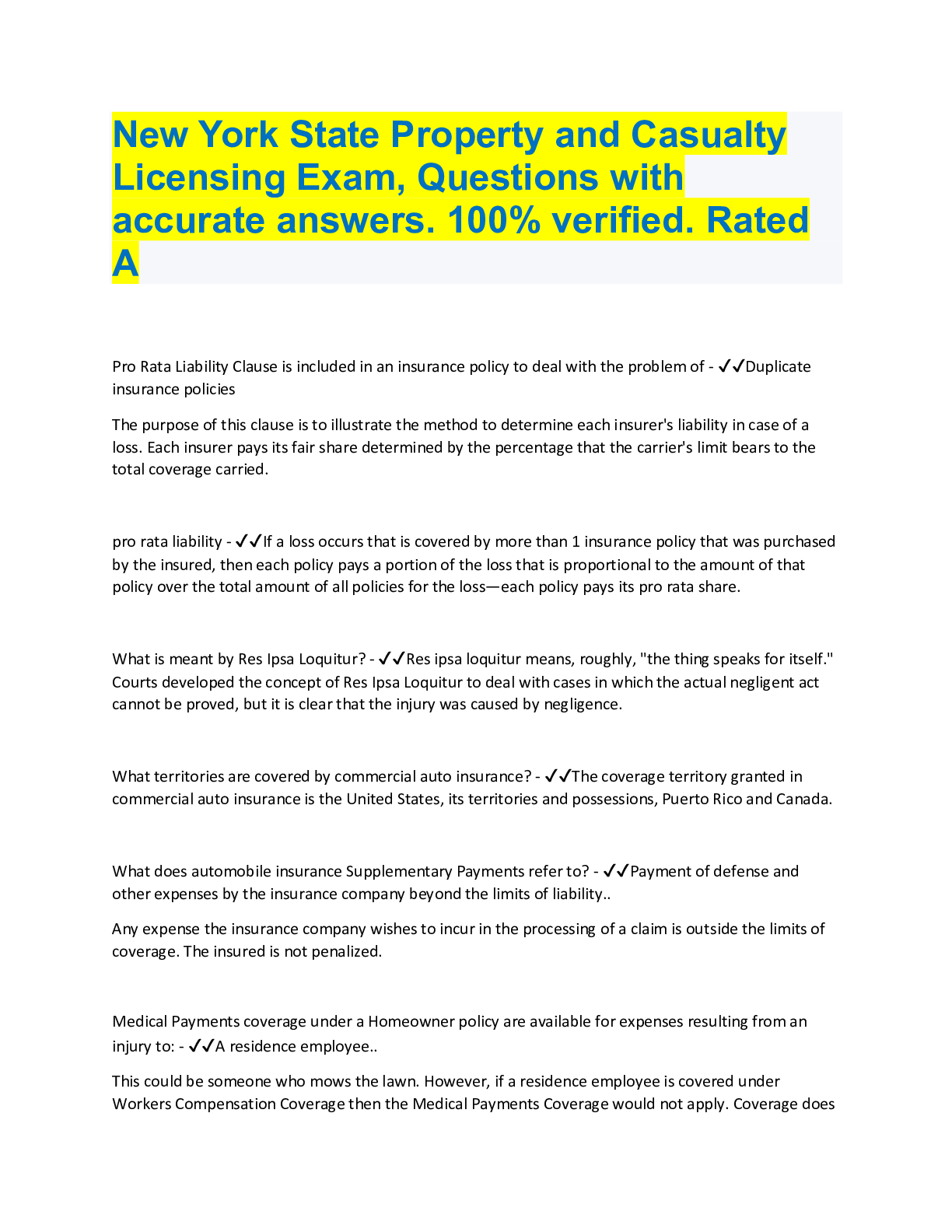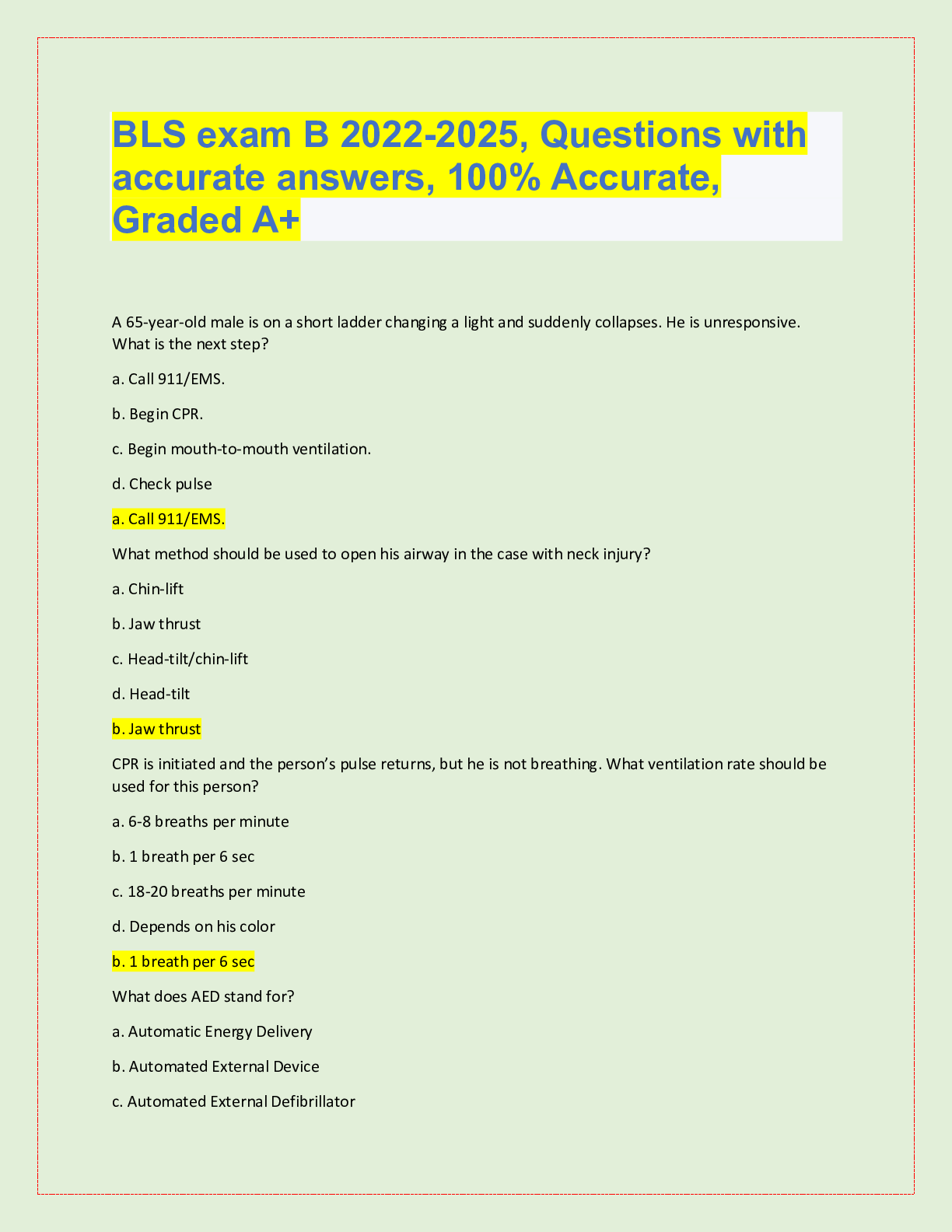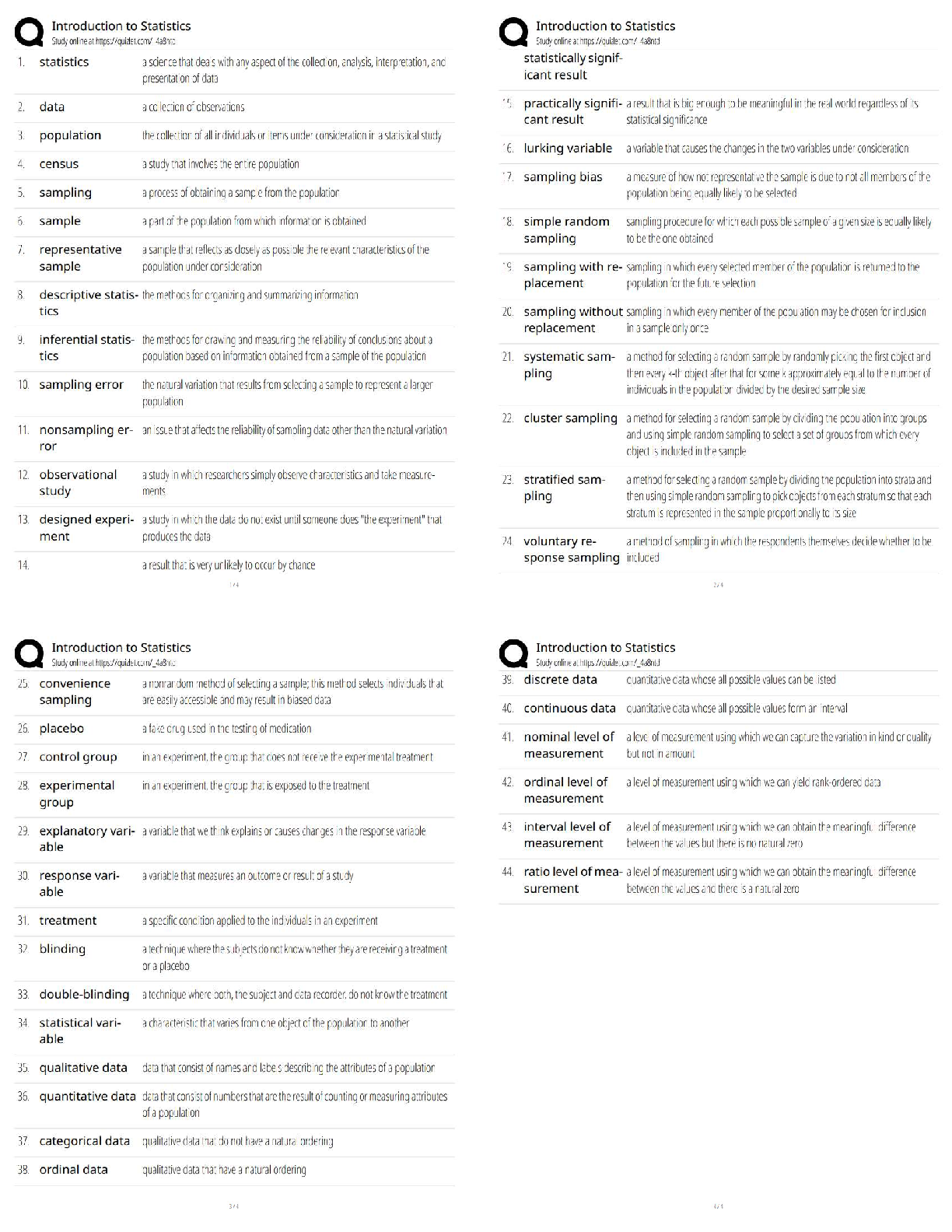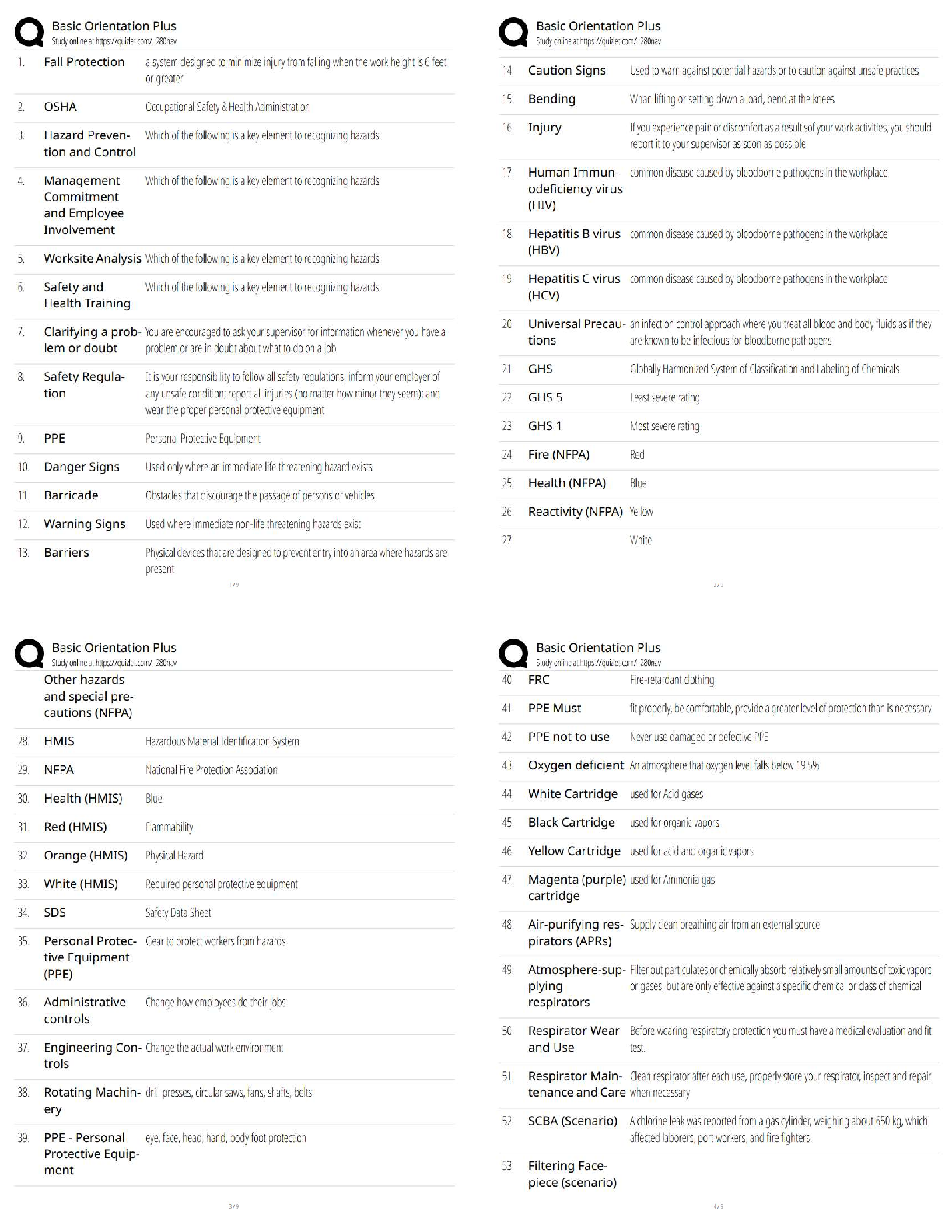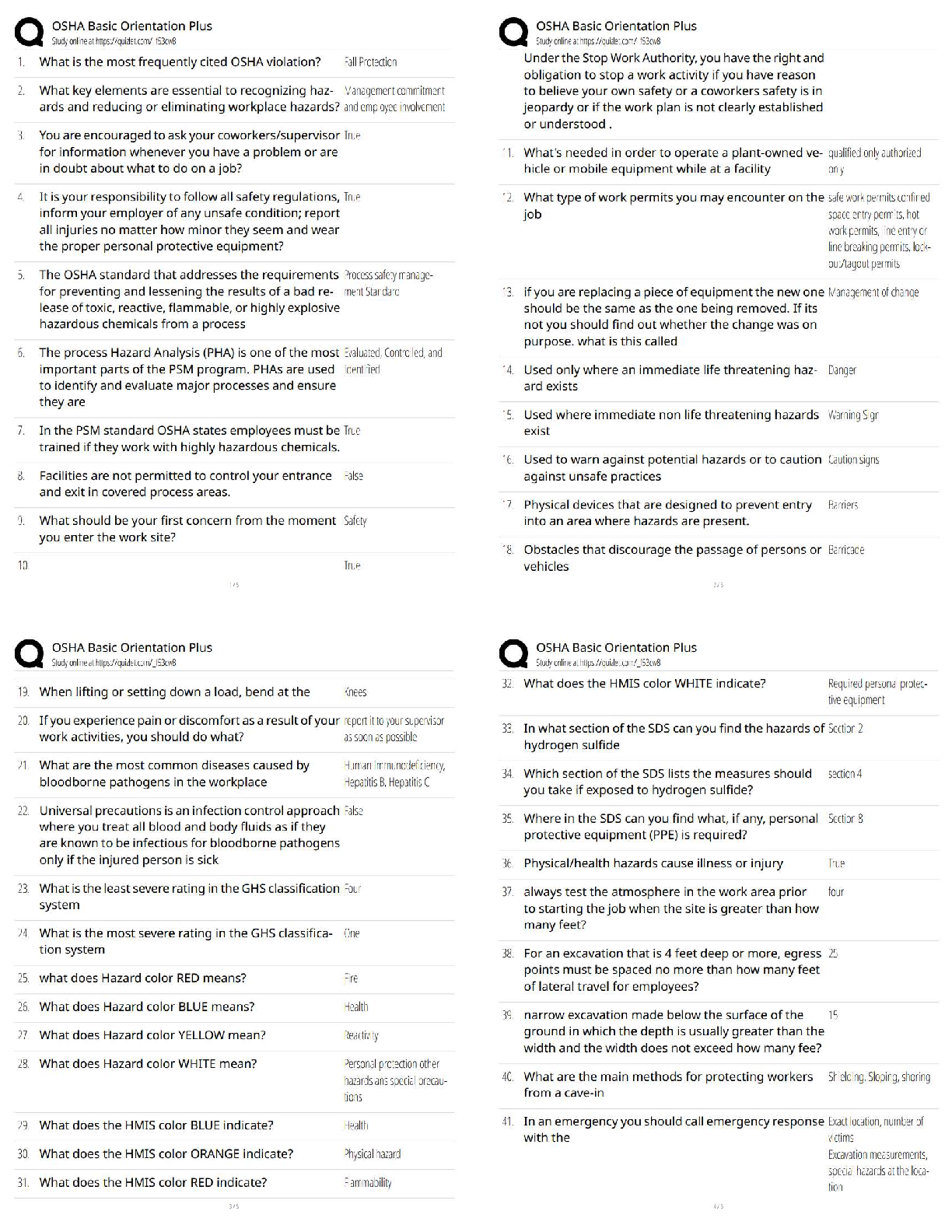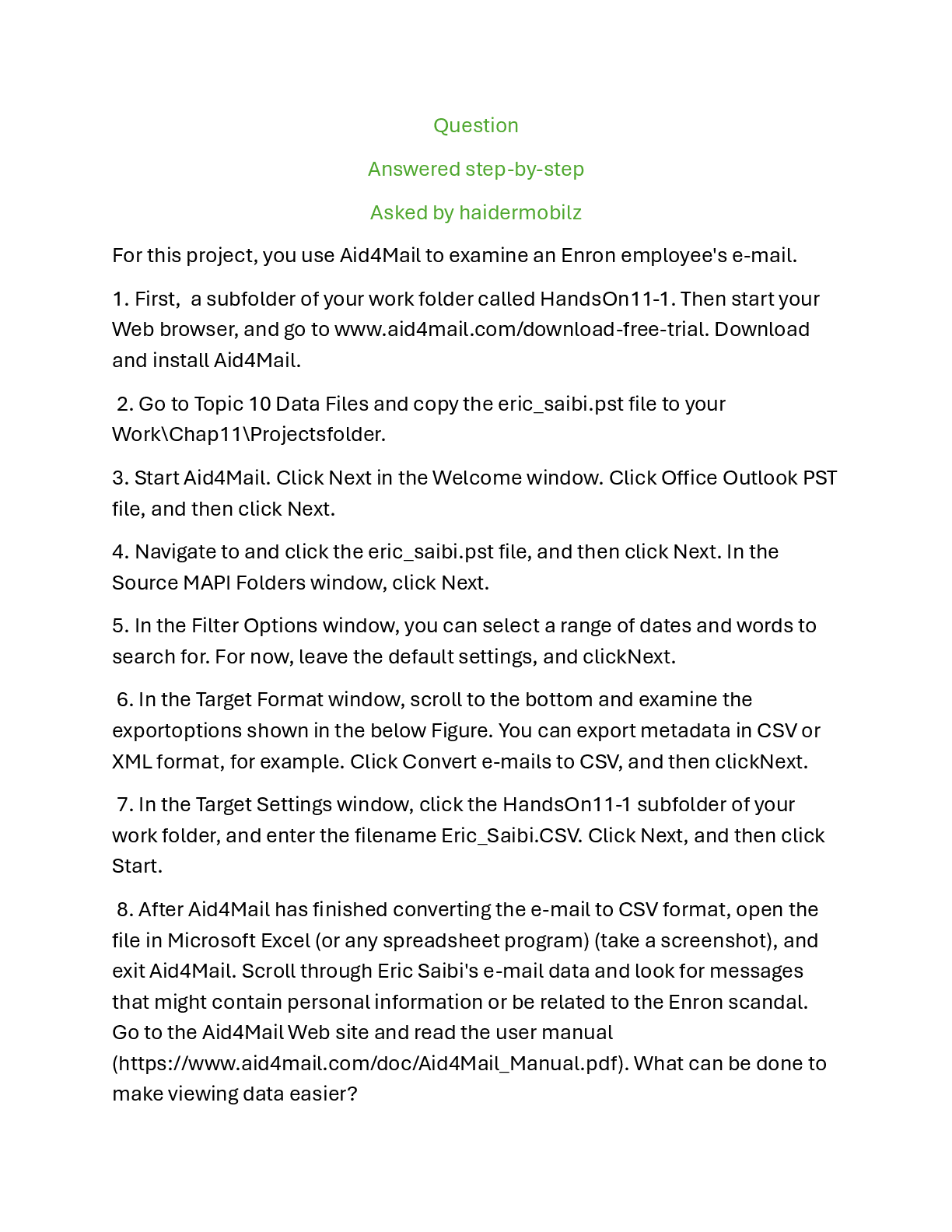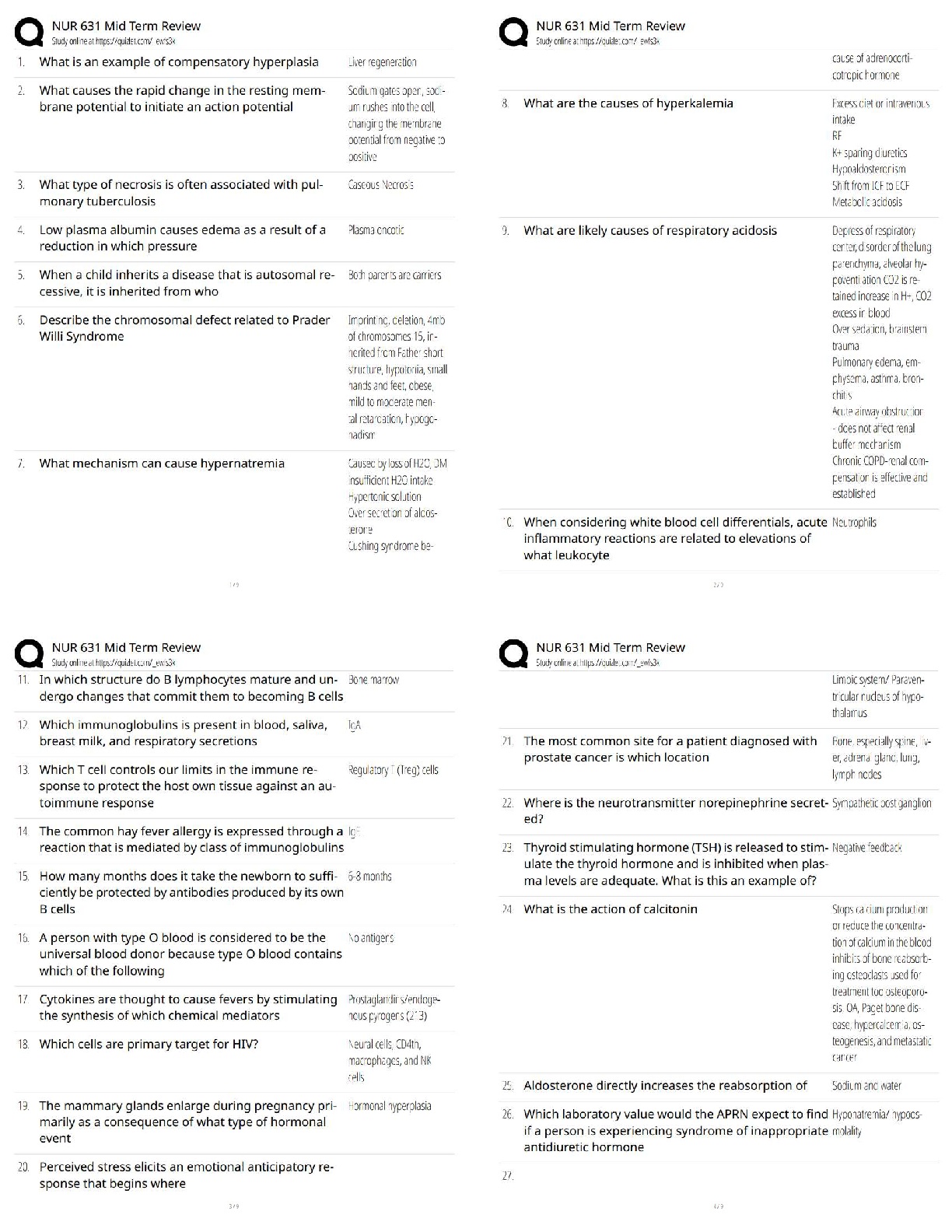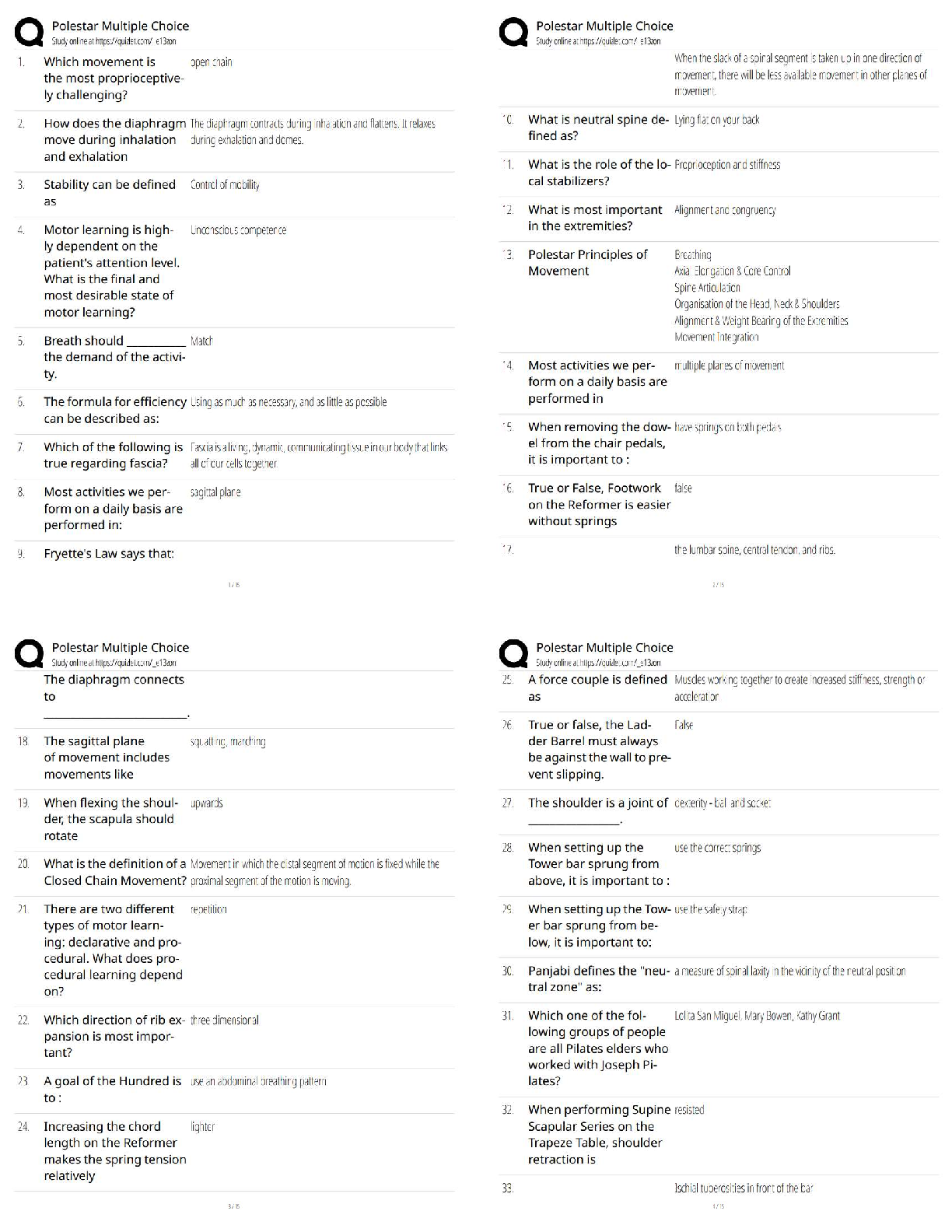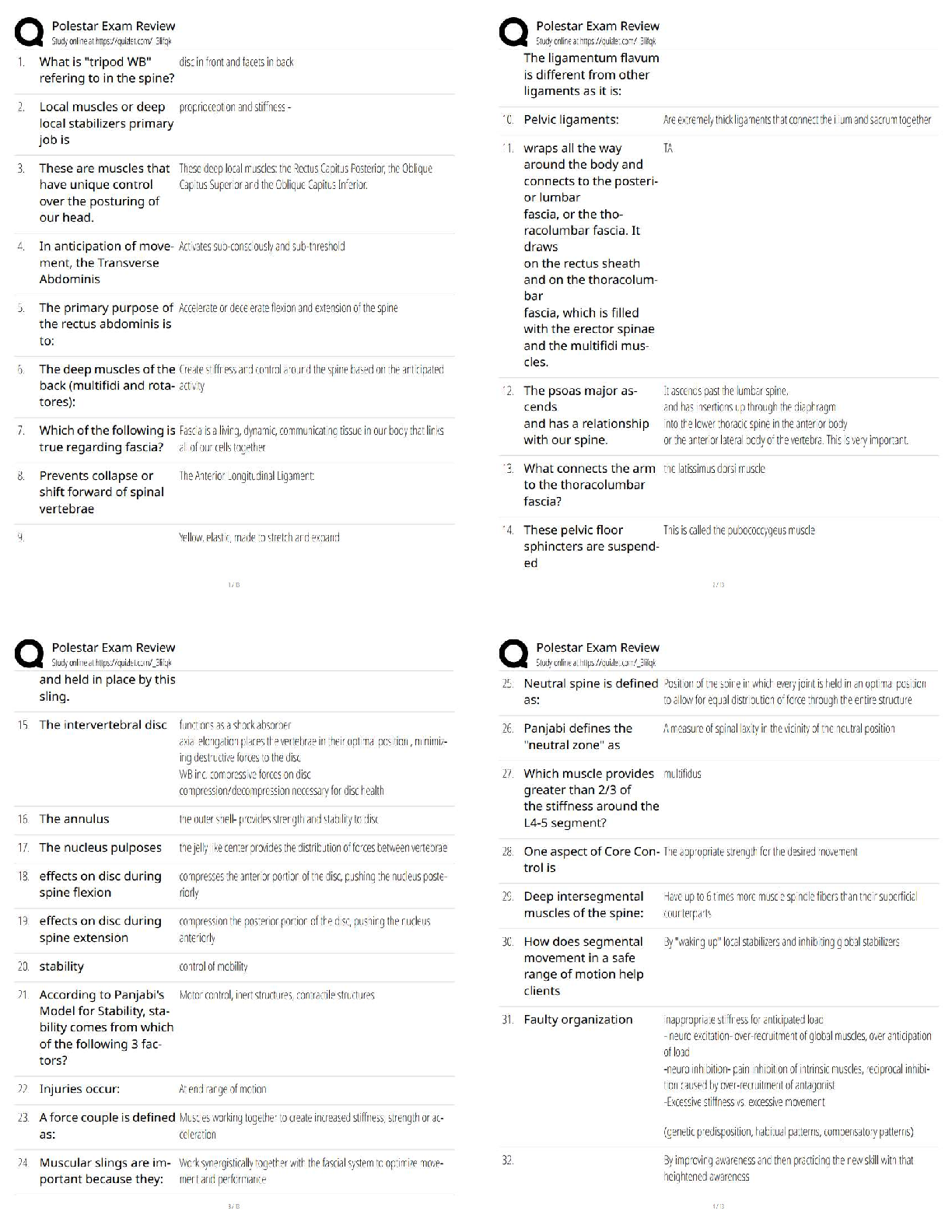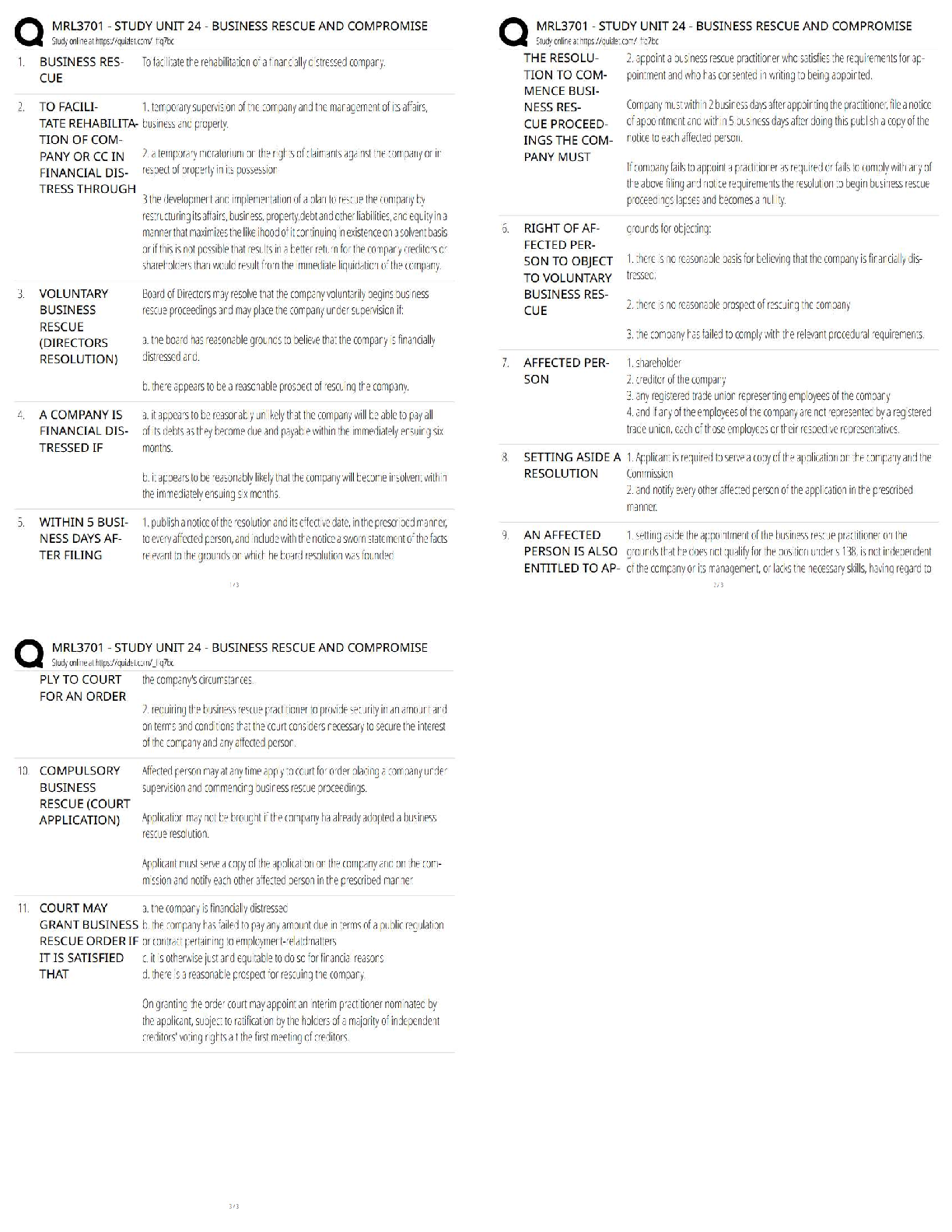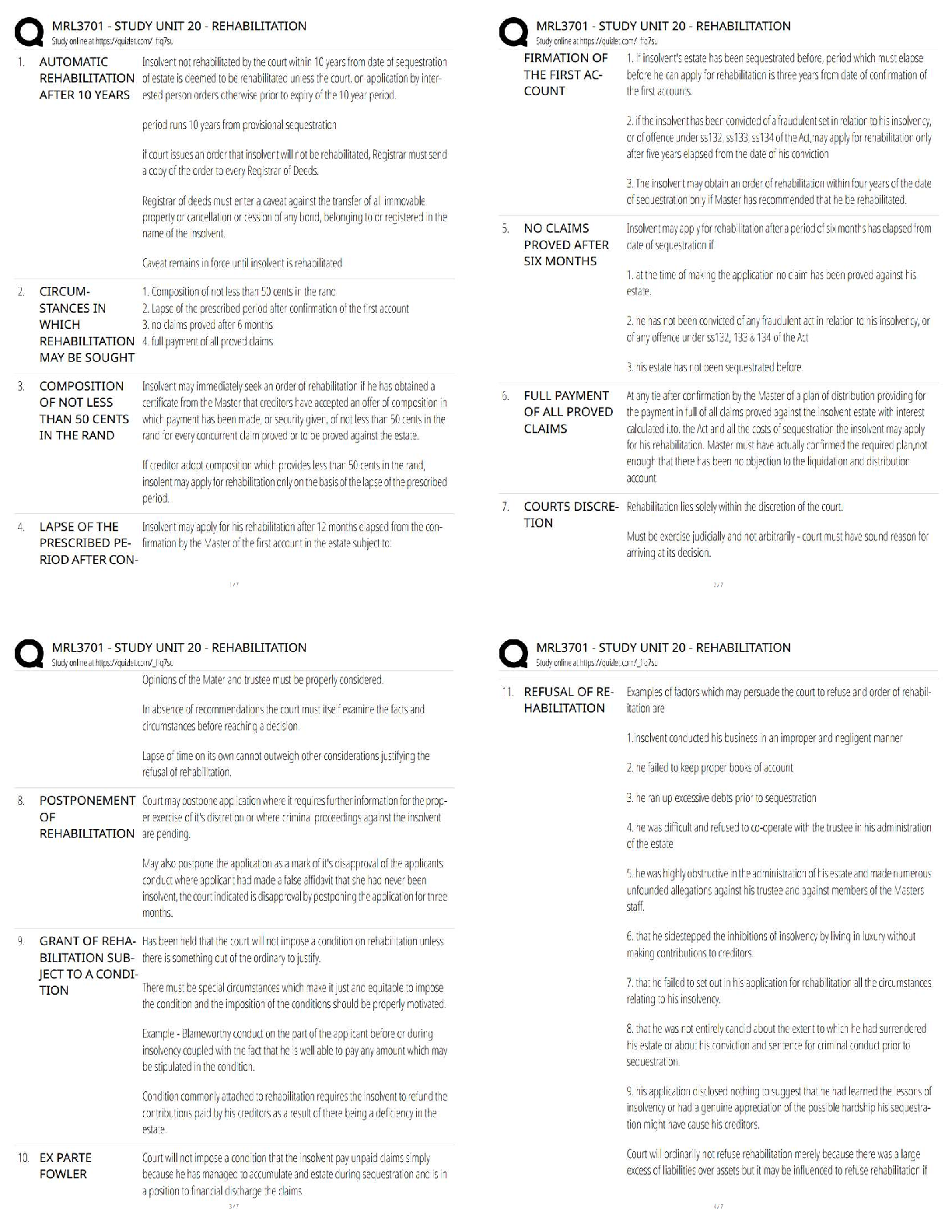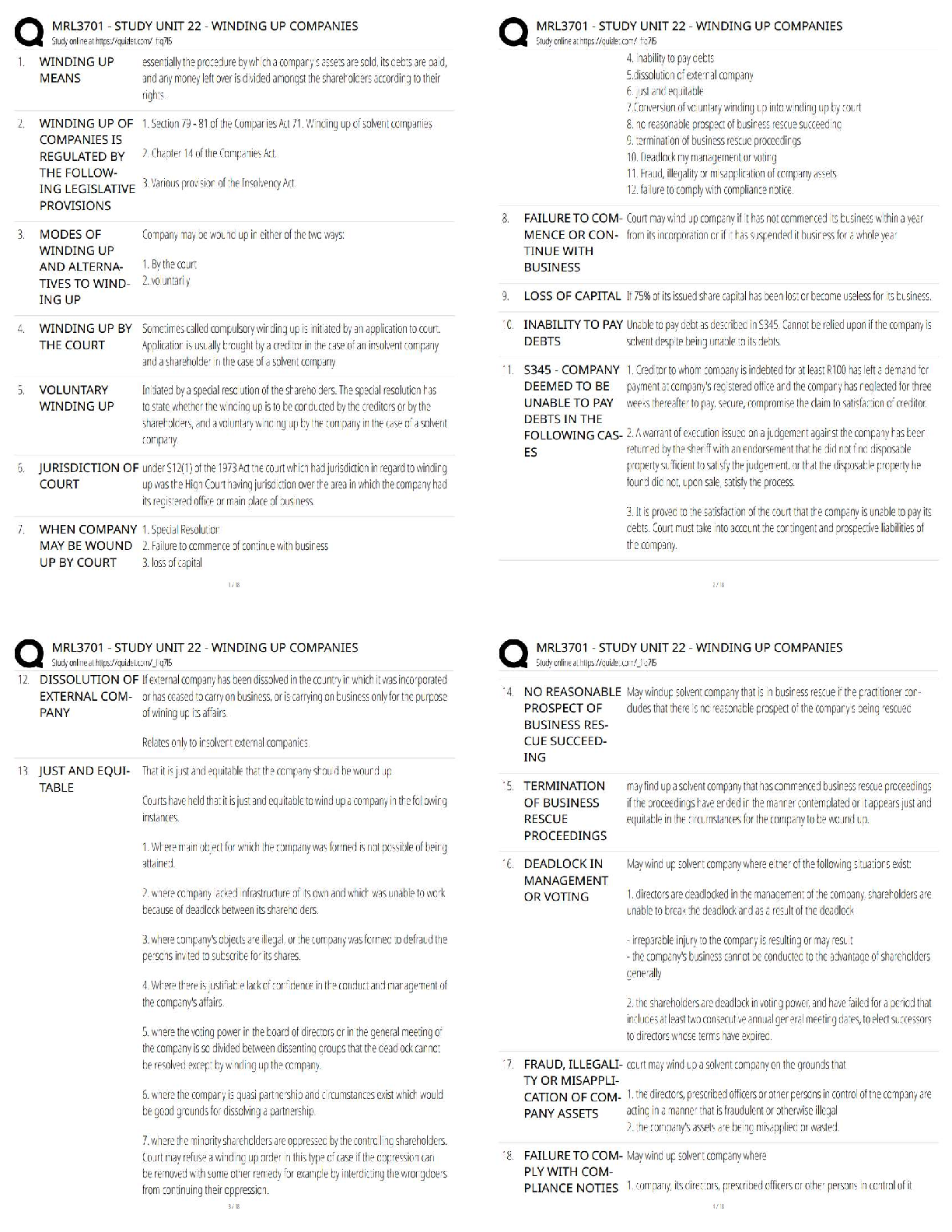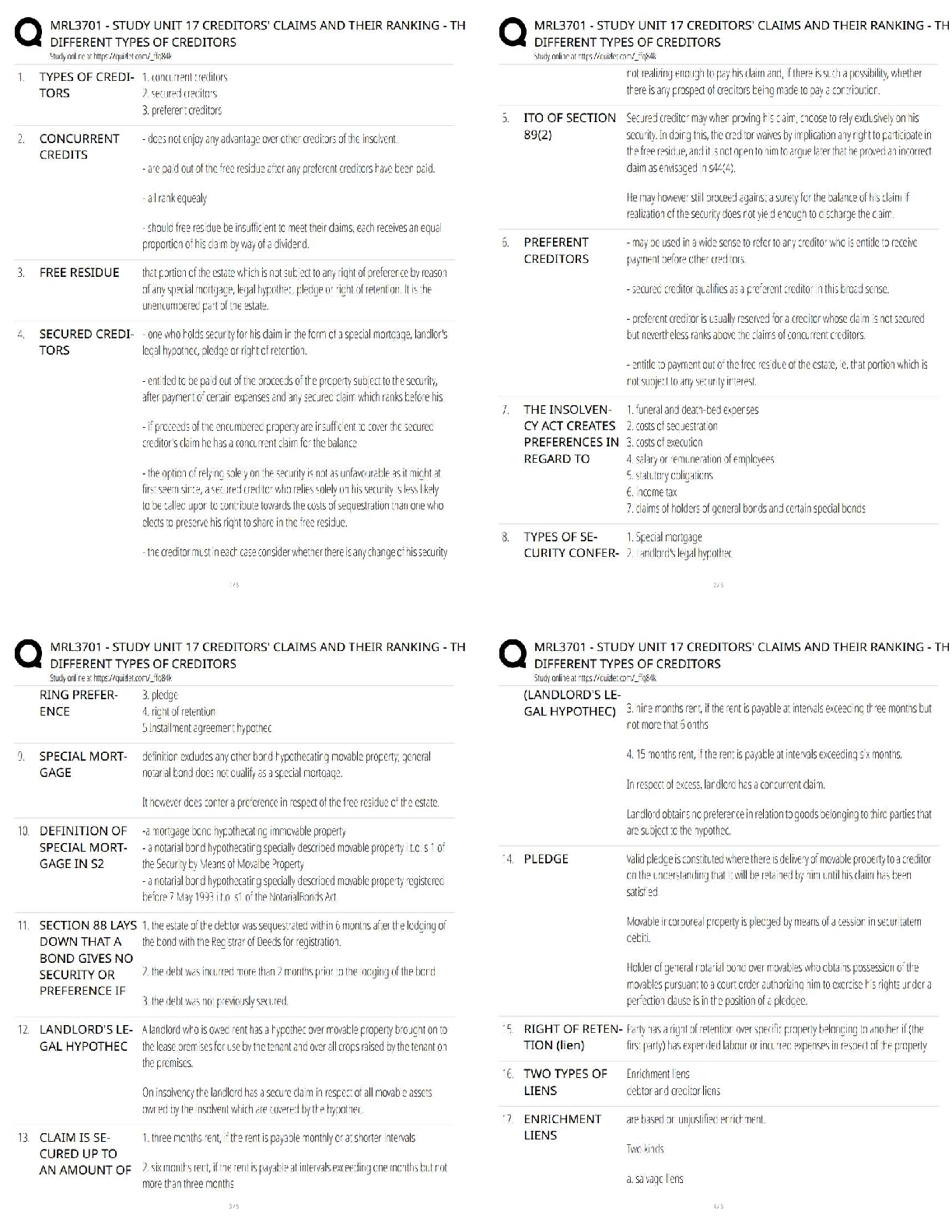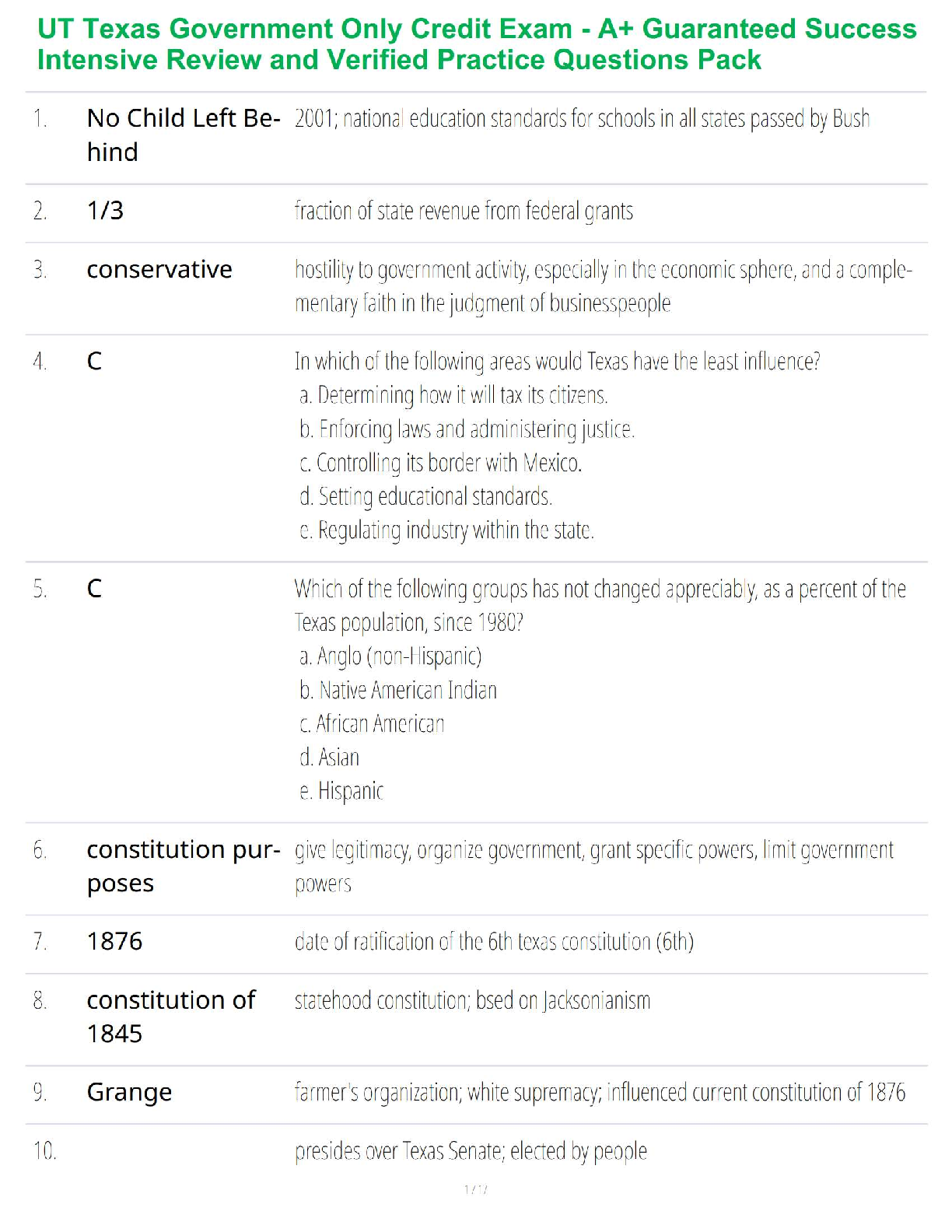NCE / CPCE study sets Questions
prepping. Rated A+. verified.
continuous development - ✔✔-view that development is a cumulative process: gradually improving on
existing skills
discontinuous development - ✔✔-view th
...
NCE / CPCE study sets Questions
prepping. Rated A+. verified.
continuous development - ✔✔-view that development is a cumulative process: gradually improving on
existing skills
discontinuous development - ✔✔-view that development takes place in unique stages, which happen at
specific times or ages
Nature vs. Nurture - ✔✔-Do genes (nature) or environmental factors (nurture) contribute more to a
person's being?
prenatal - ✔✔-conception to birth
Infancy / Child - ✔✔-Birth to 2 years- Changes in the brain and body, motor skills, perceptual,
intellectual strengthens, 1st intimate ties to other people
early childhood - ✔✔-2-6 years, Play years, refined motor skills, thought and language expand quickly,
sense or morality strengthens, build ties with other children.
middle childhood - ✔✔-6-11 years, improved athletic ability, more logical thought processes, mastery of
basic literacy skills, advancing in self-understanding, morality, friendship, begin peer-group relationships.
adolescence - ✔✔-the transition period from childhood to adulthood, extending from puberty to
independence from family, sexual maturity, abstract thinking, school achievement is important, defining
personal values/goals.
- Parietal lob develops around age 16
- Death rates by injury between ages 15-19 are six times higher than between ages of 10 -14
- The adolescent brain is about 80% developed
early Adulthood - ✔✔-18 - 40 years, leave home, complete education, full time work, concerns are
developing around career, forming intimate partnership, marrying, and rearing children.
middle adulthood - ✔✔-40-65 years, height of careers, help children being independent lives, awareness
of mortality arises.
Late Adulthood - ✔✔-65+, death looms, retirement, decrease in health
Charles Darwin (1809-1882) - ✔✔-1. British biologist who wrote "On the Origin of Species"
2. Challenged the idea of special creation by proposing a revolutionary theory of biological evolution
3. Concluded that every living plant and animal takes a part in a constant "struggle for existence" in
which only the "fittest" survive
4. Argued that the fittest are determined by a process of natural selection
G. Stanley Hall (1844-1924) - ✔✔-Set up first psychological laboratory in North America; focused on
development and education. Founded the American Journal of Psychology and pioneered the study of
child development
normative approach - ✔✔-Launched by G. Stanley Hall and Arnold Greseli. Measures of behavior are
taken on large numbers of individuals and age-related averages are computed to represent typical
development.
PROVIDES A TIMETABLE OF EXPECTED DEVELOPMENTAL EVENTS AT CERTAIN AGES.
psychosexual stages of development (Freud) - ✔✔-four distinct stages of the development of the self
between birth and adulthood, according to Freud; personality quirks are a result of being fixated, or
stuck, at any stage: Oral, Anal, Phallic, Latency, Genital.
Sigmund Freud (1856-1939) - ✔✔-founder of psychoanalysis, a controversial theory about the workings
of the unconscious mind: Id, Ego, Superego
Id (Pleasure-pain principle) - ✔✔-a reservoir of unconscious psychic energy that, according to Freud,
strives to satisfy basic sexual and aggressive drives. The id operates on the pleasure principle-pain,
demanding immediate gratification.
Ego (Reality principle) - ✔✔-the largely conscious, "executive" part of personality that, according to
Freud, mediates among the demands of the id, superego, and reality. The ego operates on the reality
principle, satisfying the id's desires in ways that will realistically bring pleasure rather than pain. The
fulcrum in the seesaw metaphor, balancing the id and the superego.
Superego (Ego Ideal, Conscience) - ✔✔-the part of personality that, according to Freud, represents
internalized ideals and provides standards for judgment (the conscience) and for future aspirations
Oral Stage (0-18 months) - ✔✔-stage focuses on pleasure on the mouth- sucking, biting, chewing
(attachment is a major factor)
Anal Stage (18-36 months) - ✔✔-pleasure focuses on bowel and bladder elimination; coping with
demands for control
Phallic Stage (3-6 years) - ✔✔-stage focuses on pleasure zone in the genitals, coping with incestuous
sexual feelings (Oedipus Complex)
identification - ✔✔-the process by which, according to Freud, children incorporate their parents' values
into their developing superegos
Latency Stage (6-puberty) - ✔✔-A phase of dormant sexual feelings, superego strengthens as the child
acquires new social values from adults and same-sex partners.
Genital Stage (puberty on) - ✔✔-sexual feelings re-emerge and are oriented toward others
Erik Erikson (1902-1994) - ✔✔-Erikson is an Ego Psychologist (Believes that man 's powers of reasoning
can control behavior) and is the only psychoanalyst whose developmental theory encompasses that
WHOLE LIFE SPAN. Described eight developmental stages, each characterized by a challenging
developmental crisis
Proposed five psychosocial stages build on Freud's theory, but added three adult stages
Frued's Psychodynamic Theory - ✔✔-Focus on the unconscious process of the id, ego, and superego.
ego defense mechanisms - ✔✔-largely unconscious distortions of thoughts or perceptions that act to
reduce anxiety
Psychosocial Theory (Erikson) - ✔✔-emphasized that in addition to mediating between id impulses and
superego demands, the ego makes a positive contribution to development, acquiring attitudes and skills
that make the individual an active, contributing member of society
Erik son's Psychosocial Theory believes that ... - ✔✔-the stages are universal and occurring similarly
regardless of culture, these stages built upon one another and no stages can be missed, and some stages
may never be reached.
Erikson's Psychosocial Stages - ✔✔-1. Trust vs. Mistrust (birth-1 year)
2. Autonomy vs. Shame and Doubt (2-3 years)
3. Initiative vs. Guilt (3-6 years)
4. Industry vs. Inferiority (6-11 years)
5. Identity vs. Identity Diffusion (12-18 years)
6. Intimacy vs. Isolation (early adulthood: 19-mid 20s)
7. Generativity vs. Stagnation/Self-Absorbtion (middle age: late 20s-50s)
8. Integrity vs. Dispair (old age: 60s and beyond)
Generativity Types - ✔✔-
Trust vs. Mistrust (Erikson) - ✔✔-0-1 years. Erikson's first stage during the first year of life, infants learn
to trust when they are cared for in a consistent warm manner
Autonomy vs. Shame and Doubt (Erikson) - ✔✔-1-3 years: Children become self-sufficient in activities
(toilieting, feeding, walking, talking) or doubt themselves. Parents should allow safe free choice and
restrain from shaming.
Initiative vs. Guilt (Erikson) - ✔✔-3-6 Years: Children want to undertake adult like activities through
make believe play or internalize limits set by parents (demand too much self- control). They feel
adventurous or guilty. Beginning to develop SELF-CONCEPT
Industry vs. Inferiority (Erikson) - ✔✔-6-11 years - Children busily learn to be competent and productive
or feel inferior and unable to do anything well.
identity vs. role confusion (Erikson) - ✔✔-Adolescence - Erikson's stage during which teenagers and
young adults search for and become their true selves
Intimacy vs. Isolation (Erikson) - ✔✔-20-40 yrs, good: love, intimate relationships, commitment. bad:
avoidance of commitment, alienation, distancing oneself
Gernerativity vs. Stagnation (Erikson) - ✔✔-Generativity means giving to the next generation through
child rearing, caring for others, or productive work. Failure in this stage results in an absence of
meaningful accomplishment.
integrity vs despair (Erikson) - ✔✔-Resolved in mature adulthood,
determining how well one has lived
Jean Piaget (1896-1980) - ✔✔-Pioneer in the study of developmental psychology who introduced a stage
theory of cognitive development that led to a better understanding of children's thought processes.
Critics of Jean Piaget - ✔✔-His findings were based on research performed on his own children.
cognitive development theory - ✔✔-children actively construct knowledge as they manipulate and
explore their world:
Piaget's stages of cognitive development - ✔✔-1. sensorimotor- Birth to 2 years
2. pre-operational- 2 to 7 years
3. concrete operational - 7 - 11 years
4. formal operational - 11 years +
sensorimotor stage (Piaget) - ✔✔-in Piaget's theory, the stage (from birth to about 2 years of age)
during which infants know the world mostly in terms of their sensory impressions and motor activities
preoperational stage (Piaget) - ✔✔-in Piaget's theory, the stage (from about 2 to 6 or 7 years of age)
during which a child learns to use language but does NOT yet comprehend the mental operations of
concrete logic, make believe play, play is less self-centered, SOCIODRAMATIC PLAY (make believe play
with others is representational; "You pretend to be an astronaut")
concrete operational stage (Piaget) - ✔✔-in Piaget's theory, the stage of cognitive development (from
about 6 or 7 to 11 years of age) during which children gain the mental operations that enable them to
think logically about concrete events, organize objects into categories, and master the concept of
CONSERVATION (they understand lemonade stays the same even if the glass is only half full).
formal operational stage (Piaget) - ✔✔-in Piaget's theory, the stage of cognitive development (normally
beginning about age 12) during which people begin to think logically about abstract concepts (time,
distance)
hypothetico-deductive thinking - ✔✔-A form of formal logic achieved during the formal operational
stage Piaget identified as the ability to generate and test hypotheses in a logical and systematic matter
and follow it with deductive reasoning.
schemes (sensorimotor stage) - ✔✔-Piaget - specific psychological structures-organized ways of making
sense of experience. Schemes change with age
organization of schemes (sensorimotor stage) - ✔✔-once children form new schemes they rearrange
them, linking them with other schemes to create a strongly interconnected cognitive system.
adaptation (sensorimotor stage) - ✔✔-involves building schemes through direct interaction with the
environment; consists of two complimentary activities, assimilation and accommodation.
assimilation (sensorimotor stage) - ✔✔-we use our current schemes to interpret the external world; if
Timmy drops an object he was assimilating it into his "dropping scheme".
or when a child sees only similarities between objects but can't discern their differences
accommodation (sensorimotor stage ) - ✔✔-we create new schemes or adjust old ones after noticing
that our current ways of thinking do not capture the environment completely; when Timmy drops
objects in different ways, he modifies his dropping scheme to take account of the varied properties of
objects
object permanence (sensorimotor stage) - ✔✔-the awareness that things continue to exist even when
not perceived
Egocentrism ( Piaget Pre operational Stage) - ✔✔-failure to distinguish other's symbolic viewpoints as
different from one's own. Three Mountains Experiment.
Conservation ( Piaget Pre Operational Stage) - ✔✔-that certain physical characteristics of objects remain
the same, even when their outward appearance changes. (Kids do not understand this concept until
Concrete Operational Stage)
Piaget and Moral Development - ✔✔-theorized how thinking about moral issues was stimulated.
Children go through 2 distinct stages of how they think about morality.
Heteronomous - morality occurs between ages 4 and 7, when the child views rules as absolutes that
result in punishment.
Autonomous - morality is characterized by the child's perception that rules are relative and can be
altered or changed.
sociocultural theory (Vygotsky) - ✔✔-Vygotsky's theory that children's cognitive growth depends on
their interactions with adults and more knowledgeable peers, which in turn are based on broad cultural
values.
Zone of Proximal Development (Vygotsky) - ✔✔-In Vygotsky's theory, the range between children's
present level of knowledge and their potential knowledge state if they recieve proper guidance and
instruction
Ecological Systems Theory (Bronfenbrenner) - ✔✔-views the person as developing within a complex
system of relationships affected by multiple levels of the surrounding environment
Urie Bronfenbrenner (1917-2005) - ✔✔-Outlined layers of environment that affect a child's
development, such as the child's own biology, family/community environment, and society.
Microsystems (Bronfenbrenner) - ✔✔-development happens within elements of the person's immediate
surroundings, such as family and peer group
Mesosystem (Bronfenbrenner) - ✔✔-in the bioecological model, the interconnections among
immediate, or microsystem, settings ( ex: a child's academic progress depends not just on activities that
take place in classrooms but also on parent involvement in school life...)
Exosystem (Bronfenbrenner) - ✔✔-The concept of social settings that do not contain the developing
person but nevertheless affect experiences in immediate settings that indirectly influence the child.
Ex: Extended family
macrosystems (Bronfenbrenner) - ✔✔-Consists of cultural values, laws, customs, and resources
individualistic culture - ✔✔-A culture in which people believe that their primary responsibility is to
themselves.
collectivist cultures - ✔✔-cultures in which the self is regarded as embedded in relationships, and
harmony with one's group is prized above individual goals and wishes.
Classical Conditioning (Pavlov) - ✔✔-a type of learning in which one learns to link two or more stimuli
and anticipate events. The dog learns that food will come when the bell is rang and starts salivating. So
despite the presence of food, when the bell is rung, the dog will start drooling
Operant Conditioning (Pavlov) - ✔✔-the subject will operate on the environment, and stimuli that follow
their behavior change the probability that the behavior will occur again.
reinforcer (operant conditioning) - ✔✔-In operant conditioning the reinforcer is a stimulus that
increases the occurrence of a response.
Punishment (operant conditioning) - ✔✔-in operant conditioning the punishment occurs when removing
a desirable stimulus or presenting an unpleasant one to decrease the occurrence of a response.
Habituation (Operant Conditioning) - ✔✔-refers to a gradual reduction in the strength of a response due
to repetitive stimulation. Adding a new stimulus- a change in the environment- causes responsiveness to
return to a high level. This is called recovery.
John Bowlby's Ethological Theory of Attachment (1969) - ✔✔-recognizes the infant's emotional tie to
the caregiver as an evolved response that promotes survival (the infant has innate signals that have
evolved over time to keep the parent figure attached emotionally).
Bowlby's 4 phases of attachment development - ✔✔-1. Attachment Phase (birth to 6 weeks)
2. "Attachment in the making" Phase (6 weeks to 8 months)
3. "Clear-Cut" Attachment Phase (6-8 months to 18 months)
4. Formation of a reciprocal relationship (18 months to 2 years)
Bowlby's Preattachment phase - ✔✔-Built in signals, grasping, smiling, gazing, crying. Babies recognize
mother but have not attached yet.
Bowlby's "Attachment-in-the-making" phase - ✔✔-infants repsond differently to familiar caregiver than
to a stranger, develop a sense of trust but do not have an issue when passed to the stranger
In Bowlby's "clear-cut" attachment phase - ✔✔-babies display separation anxiety
Bowlby's formation of a reciprocal relationship - ✔✔-language development promotes understanding,
separation protests decrease, negotiation begins
Bowlby's internal working model has been described as, " a cognitive framework comprising mental
representations for understanding the world, self and others." Which of the following is NOT one of the
three ain features of the internal working model?
-a model of others being trustworthy
- a model of the family being a safe place
- a model of the self as valuable
- a model of the self as effective when interacting with others. - ✔✔-A model of the family being a safe
place is not apart of the INTERNAL working model.
Bowl by stated that the term ____________________ is "the attachment conceptualized as being a vital
and close bond with just one attachment figure." - ✔✔-Monotropy
gender schema theory - ✔✔-The theory that gender-role development is influenced by the formation of
schemas, or mental representations, of masculinity and femininity. Explains how the environmental
pressures and the child's cognition work together to shape gender role development.
Sternberg's Triarchic Theory - ✔✔-Robert Sternberg - our intelligence is best classified into three areas
that predict real-world success: analytical, creative, and practical
Gardner's Theory of Multiple Intelligences - ✔✔-Howard Gardner (1983-2000)- Theory defines
intelligence in terms of distinct sets of processing operations that merit individuals to engage in a wide
range of culturally valued activities.
1. Linguistic
2. Logico-mathamatical
3. Musical
4. Spatial
5. Bodily-Kinesthetic
6. Naturalist
7. Interpersonal
8. Intrapersonal
identity development principle - ✔✔-People seek to develop a stable sense of whom they are and then
strive to act consistently with this self-view.
Identity Achievement (Marcia - 1980) - ✔✔-commitment to values, beliefs, and goals following a period
of exploration
Identity Moratorium (Marcia - 1980) - ✔✔-exploration without having reached commitment
Identity Foreclosure (Marcia - 1980) - ✔✔-commitment in the absence of exploration
Identity Diffusion (Marcia - 1980) - ✔✔-an apathetic state characterized by lack of both exploration and
commitment
Kohlber's theory of moral development - ✔✔-Kohlberg expands on Piaget's conceptualization of moral
development; used a clinical interviewing procedure in which he presented a sample of 10- to 16-year
old BOYS with hypothetical moral dilemmas. They were re-interviewed at 3- to 4- year intervals over the
next 20 years. The best know dilemma is the "Heinz dilemma" (pits the value of obeying the law (not
stealing the drugs) against the value of human life (saving his dying wife). Kohlberg emphasized that
moral maturity is determined by the way we reason about the dilemma not the content of the response.
Kohlberg's stages of moral development - ✔✔-pre conventional, conventional, post conventional ( it is
believed that most people never reach this level)
epigenetic principle - ✔✔-Erikson, Kohlberg, and Maslow's theories are epigenetic, which means that
each stage emerges from the one before it. The process follows a given order and is systematic.
Labouvie-Vief's Theory - ✔✔--In early adulthood, individuals move from hypothetical to pragmatic
thought--an advance in which logic is a tool for solving real-world problems
-From adolescence to middle adulthood, people gain in cognitive-affective complexity--the ability to
integrate objective thoughts and subjective feelings into an organized structure
Levison's Seasons of Life - ✔✔-Levison (1978 - 1996) depicted adult development as a sequence of
qualitatively distinct eras ( or "seasons") coinciding with Erikson's stages and separated by transitions.
Yale research by Daniel Levinson - ✔✔-Found that 80% of men experienced moderate "midlife crises",
and an "age 30 crisis" occurred in men if they felt it would soon be too late to make changes in their
lives
Vaillant's Adaptation to Life - ✔✔-20s - intimacy concerns
30s - career consolidation
40s - generative
50s-60s - "keepers of meaning"
70s - spiritual and reflective
Follows Erikson's stages but fills in the gaps (Vaillant focused on only men during this study)
Robert Sternberg's Triangular Theory of Love (1988 - 2006) - ✔✔-The 3 components of love are passion,
commitment, and intimacy
Kubler-Ross stages of dying - ✔✔-denial and isolation, anger, bargaining, depression, acceptance
Harry Stack Sullivan's Interpersonal Theory - ✔✔-The purpose of all behavior is to get needs met
through interpersonal interactions and to decrease or avoid anxiety. (Stages from infancy to later
adulthood)
Maturation Theory - ✔✔-Frued and Erikson are consider to be maturationists: Behavior is guided
exclusively via heredity factors until the necessary stimuli are present in the environment. An
individual's neural development must be at a certain level of maturity for the behavior to unfold.
Margaret Mahler - ✔✔-A psychologist who described early development as a sequential process of
separation of the child from the mother or primary caregiver
Separation-Individual Theory of child development - ✔✔-child's absolute dependence on the female
caretaker is called "symbiosis". Difficulties in the symbiotic relationship can result in adult psychosis.
Harry Harlow's attachment research - ✔✔-studied infant attachment using rhesus monkey's
Sentence: In the 1950s, researcher Harry Harlow raised baby monkeys with two artificial wire frame
figures made to resemble mother monkeys.
Elenor Maccoby and Carol Jacklin - ✔✔-reviewed literature and found that males only outperformed
females in mathematics around high school and college age. This may come from child-rearing patterns
rather than bodily chemistry.
Eleanor Gibson - ✔✔-The "visual cliff" experiment. Showed that depth perception cues are innate.
Empiricists - ✔✔-philosophical belief that knowledge is gained from experience of senses ( evidence can
be measured)
A mother hides a toy behind her back and a young child does not believe the toy exists anymore. The
child has not mastered... - ✔✔-Object permanence (object constancy) or representational thought
The schema (i.e. mental representation of the real world) of permanency and constancy of objects
occurs in the... - ✔✔-sensorimotor stage - birth to 2 years
Ethology (Konrad Lorenz / geese and imprinting/natural aggression) - ✔✔-the study of animals in their
natural environment
Critical Periods (Lorenz) - ✔✔-certain behaviors must be learned at an early time in development or they
will never be learned
The sequence of object loss, which goes from protest to despair to detachment, best describes the work
of - ✔✔-Bowlby (Babies and Bonding)
Primal Scene - ✔✔-the infant's or the child's witnessing of parental sex
sibling rivalry - ✔✔-the competition between brothers or sisters for parents' affection and attention
BASIC ID (holistic approach) - ✔✔-Idea from Lazarus, who feels that counseling is multimodal (using a
variety of techniques) an acronym meaning B= behaviors A= affective S= sensations I= images
C=cognitions I=interpersonal D= drugs
A preschool child's concept of causality is said to be animistic. This means the child attributes human
characteristics to inanimate objects. This concept is best related to... - ✔✔-Piaget's pre operational
period, 2 - 7 years
Freud's wish-fulfillment theory - ✔✔-slips of the tongue or dreams preserve sleep and provide a
"psychic safety valve"—expressing otherwise unacceptable feelings; contain manifest (remembered)
content and a deeper layer of latent content (a hidden meaning).
Which theorist was most concerned with maternal deprivation? - ✔✔-H. Harlow - rhesus monkey
experiment with surrogate wire monkeys./
Konrad Lorenz (1903-1989) - ✔✔-ethology (animal behavior); studied imprinting and critical periods in
geese, and natural aggression
Martin E. P. Seligman - ✔✔-experimented with learned helplessness on dogs by giving them electric
shocks while in a harness until they stopped trying to escape.
(memory: 'Selig' sounds like 'sick' like the dogs must've been)
The statement, "bad behavior is punished, good behavior is not" is most closely associated with... - ✔✔-
Kohlberg's premolar stage at the pre conventional level.
Imprinting - rapid learning during a critical period of development, is an instinct in which a newborn will
follow a moving object. The primary work in this area was done by... - ✔✔-Konrad Lorenz ( baby
goslings, imprinting, natural aggression, species specific behavior)
Maslow's Hierarchy of Needs - ✔✔-(level 1) Physiological Needs, (level 2) Safety and Security, (level 3)
Relationships, Love and Affection, (level 4) Self Esteem, (level 5) Self Actualization
To research the dilemma of self-actualization, Maslow... - ✔✔-interviewed the best people he could find
who escaped the "psychology of the average"
Piaget is... - ✔✔-a structuralist who believes stage changes are qualitative.
Piaget referred to the balance between assimilation and accommodation as... - ✔✔-equilibration
FAP - ✔✔-fixed action patterns by sign stimuli - ritualistic behaviors which are common to all members
of a species.
Robert Kegan speaks of a "holding environment" in counseling in which - ✔✔-the client can make
meaning in the face of a crisis and can find new direction.
Alfred Adler (1870-1937) - ✔✔-Worked with Freud, FATHER OF INDIVIDUAL PSYCHOLOGY. Inferiority
Complex: fixation on feelings of personal inferiority that can lead to emotional and social paralysis.
Compensation: our efforts to overcome real or perceived weaknesses. BIRTH ORDER DETERMINES
PARTS OF OUR PERSONALITY.
Carl Gustav Jung (1875-1961) - ✔✔-FOUNDER OF ANALYTIC PSYCHOLOGY
Eric Berne - ✔✔-Father of Transactional Analysis (TA), suggested the group is held together by a bond
between the leader and the group members.
Eric Berne's transactional analysis (TA) posits three ego states: the Child, the Adult, and the Parent.
These roughly correspond to Freud's structural theory that includes - ✔✔-id, ego, superego. Note:
Berne's Child, Adult, Parent are hypothetical constructs used to explain the function of the personality.
Freud felt that successful resolution of the Oedipus complex led to the development of the superego.
This is accomplished by... - ✔✔-identification with the aggressor, the parent of the SAME SEX.
Transference - ✔✔-(psychoanalysis) the process whereby emotions are passed on or displaced from one
person to another
Freudians refer to the ego as - ✔✔-the executive administrator of the personality and the reality
principle. The ego is the police officer controlling the impulses of the id (instincts) and the superego (the
conscience)
Eros (Freudian concept): - ✔✔-the instinct toward life
Thanatos (Freudian concept): - ✔✔-an instinctual drive toward death, leading to aggressive action.
Freud stated, "It is at work in every living being and is striving to bring it to ruin..."
Joseph Wolpe (1915-1997) - ✔✔-Systematic Desensitization: individuals gradually exposed to fears
(usually through imagination) while practicing relaxation exercises
Most scholars would assert that Freud's 1900 work entitled The Interpretation of Dreams was his most
influential work. Dreams have... - ✔✔-manifest content (surface meaning), and latent content (hidden
meaning)
Little Hans - ✔✔-Cites PSYCHOANALYTIC theory; Hans was a small child who had difficulty going into
streets and was afraid of horses biting him. Freud used psychoanalytic constructs such as the Oedipus
complex and castration to anxiety to explain it.
Little Albert ( Study by John Broadus Watson) - ✔✔-BEHAVIOR CONDITIONING-Little Albert learns to
make associations between stimuli in the environment and reflexes; Albert shows little fear with dog,
monkey, or burning newspaper, neutral stimuli since he hasn't learned to fear anything; Shows Albert a
white rat while making loud clanging noise, which upsets Albert, who eventually associates white rat
with being upset; Proves fear is learned.
Anna O. Case - ✔✔-First PSYCHOANALYTIC patient. Famous case of hysteria treated by Breuer and
reported by Breuer and Freud in Studies on Hysteria; gave Freud the insight that hysterics suffer from
their memories of traumatic events; details distorted over the years.
Daniel Paul Schreber Case - ✔✔-PSYCHOANALYTIC-Wrote an autobiography of personal dealings with
paranoia. Freud wrote about Schreber's unconscious issues of homosexuality. (Wanted to breed with
God as a woman and create a new race)
Catharsis - ✔✔-the process of releasing, and thereby providing relief from, strong or repressed
emotions.
Topographical theory of the mind (Freud) - ✔✔-ICEBERG metaphor. Conscious, preconscious,
unconscious
Structural Theory of the personality - ✔✔-id, ego, superego
precocious mind (Freud) - ✔✔-thoughts and feelings that individuals are unaware of, and can easily be
accessed
Conscious Mind (Freud) - ✔✔-Aware of the immediate environment
Unconscious mind (Freud) - ✔✔-level of the mind in which thoughts, feelings, memories, and other
information are kept that are not easily or voluntarily brought into consciousness
Subconciousness - ✔✔-is a store of information that was registered in memory without being
consciously attended.
ego ideal (superego) - ✔✔-part of the superego that contains the standards for moral behavior ( we
judge ourselves against this ideal)
Repression (defense mechanism) - ✔✔-- Involuntary blocking of unpleasant feelings and experiences
from ones awareness.
EX: An accident victim can remember nothing about the accident
reaction formation (defense mechanism) - ✔✔-switching unacceptable impulses into their opposites
EX: Spending all of your time caring for an elderly parent when you unconsciously would like to see them
die.
Denial (defense mechanism) - ✔✔-refusing to believe or even perceive painful realities
sublimation (defense mechanism) - ✔✔-- Rechanneling of drives or impulses that are personally or
socially unacceptable into activities that are constructive.
EX: Mom of son killed by drunk driver, becomes president of MADD.
EX: aggressive person becomes a professional boxer
Introjection: Defense Mechanism - ✔✔-- Integrating the beliefs and values of another individual into
ones own ego structure.
EX: Children integrate their parents value system into the process of conscience formation.
displacement (defense mechanism) - ✔✔-discharging impulses from a threatening object to a safer
object
EX: The man who is mad at his boss but is afraid to show it so he comes home and kicks the family dog.
Rationalization (defense mechanism) - ✔✔-- Attempting to make excuses or formulate logical reasons to
justifying unacceptable feelings or behaviors.
EX: John tells the rehab nurse, "I drink because its the only way I can deal with my bad marriage and
awful job."
EX: I'm glad that I didn't get good grades, only nerds get good grades (*SOUR GRAPES
RATIONALIZATION*)
EX: I'm really glad that my brother died, now I can have his room (*SWEET LEMONS RATIONALIZATION*)
Identification (defense mechanism) - ✔✔-imitating central figure in one's life (act like boss, dress like
parents, etc.) (identify as someone better to be better)
EX: Jane is the president of the board at a homeless shelter. When she is asked to introduce herself in
any situation, she responds with "I'm the president of the board..."
projection (defense mechanism) - ✔✔-- Attributing feelings or impulses unacceptable to ones self to
another person.
EX: Sue feels a strong sexual attraction to her track coach and tells her friend, "Hes coming on to me!"
Compensation : Defense Mechanism - ✔✔-- Covering up a real or perceived weakness by emphasizing a
trait one considers more desirable.
EX: A handicapped boy is unable to participate in football, so he compensates by becoming a great
scholar.
EX: A man feels intellectually inferior so he becomes a body builder
Rationalization, compensation, repression, projection, reaction formation, identification, introjection,
denial, and displacement are ego defense mechanisms. According to Freudians, the most important
defense mechanism is.... - ✔✔-Repression
Suppression differs from repression in that
a) suppression is stronger
b) repression only occurs in children
c) repression is automatic or involuntary
d) all of the above - ✔✔-repression is automatic or involuntary
___________________ is like looking in the mirror but THINKING that you are looking out the window. -
✔✔-Projection
A client who has incorporated his father's values into his thought patterns is a product of... - ✔✔-
Introjection (Think "injection" like a needles injects a substance)
Organ Inferiority (Alfred Adler individual psychology) - ✔✔-everyone is born with some physical
weakness or unique quality
C.G. Jung the founder of analytic psychology, said men operate on logic or the ______ principle, while
women are intuitive operating on the ______ principle - ✔✔-Logos (appeal to the logic); Eros (intuitive,
will to live)
Jung used drawings balanced around a center point to analyze himself, his clients, and dreams. What are
these called? - ✔✔-mandalas
Mandalas - ✔✔-geometric designs that are symbols of the universe and aid in meditation
projective drawing - ✔✔-memory or vision we imagine, exists only in our minds.
eidetic imagery (photographic memory) - ✔✔-the ability to remember the most minute details of a
scene or a picture for an extended period of time "eidetikers"
Constructivist Therapists - ✔✔-stress that it is imperative that we as helpers understand the client's
view (also known as constructs) to explain his/her problems. Two popular classes of constructivist
therapy, include brief therapy, which examines what worked for a client in the past, and narrative
therapy, which looks at the stories in the client's life and attempts to rewrite or reconstruct the stories
when necessary.
_________________ emphasized the drive for superiority. - ✔✔-Alfred Adler
The statement "Sibling interaction may have more impact than parent-child interaction" describes... -
✔✔-Alfred Adler's theory
Constructivist Theory (Piaget) - ✔✔-Piaget's theory, in which cognitive development results from
children's active construction of reality, based on their experiences with the world
In contrast with Freud, the neo-Freudians emphasized - ✔✔-social factors
Neo-Freudians, Alfred Adler, Karen Horney, Erik Erikson, Harry Stack Sullivan, and Erich Fromm stressed
the importance of cultural (social) issues, and interpersonal (social) relations.
Baseline Measures - ✔✔-Behaviorist term that indicates the frequency that a behavior is manifested
prior to, or in the absence of, treatment.
Unconditional Positive Regard - ✔✔-a caring, accepting, nonjudgmental attitude, which CARL ROGERS
believed would help clients to develop self-awareness and self-acceptance
Carl Rogers - ✔✔-Developed "client-centered" therapy, unconditional positive regard / warmth /
empathy are cornerstones in the therapy, no diagnosis,
The terms introversion and extroversion are associated with.... - ✔✔-C.G. Jung (Think about a band
name THE YOUNG INTROVERTS!)
The personality types of the Myers-Briggs Type Indicator (MBTI) are associated with the work of.... -
✔✔-Carl G. Jung ( Extroversion, Introversion; sensing/intuition; thinking/feeling; judging/perceiving
Ralph Dreikurs (Student of Adler) - ✔✔-The first to discuss the use of group therapy in private practice
TAT (Thematic Apperception Test) - ✔✔-a projective test in which subjects look at and tell a story about
ambiguous pictures
Adler emphasized that people wish to belong. This is known as - ✔✔-social connectedness
Adler believed that the_________________was the mainstay of personality development. - ✔✔-
UNCONCSIOUS
animus (male)/anima (female) JUNG - ✔✔-The biological and psychological aspects of masculinity and
femininity, which are thought to coexist in both sexe
[Show More]
